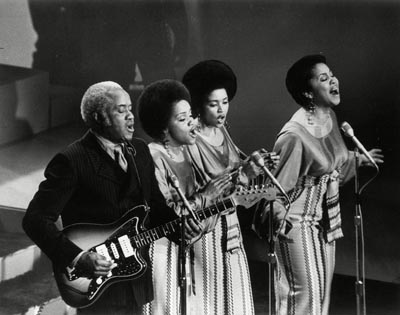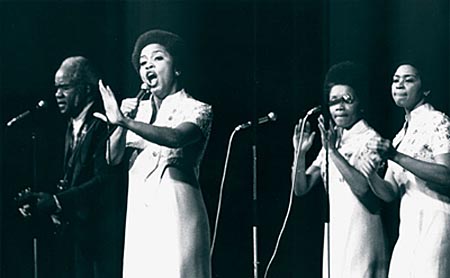
[Some computers might ask you to allow the music to play on this page]
Mavis Staples Crossing Over |

Mavis Staples (Photo by Adam Bielawski)
In these extracts from the book Black Gospel, author Viv Broughton tells the story of the cost of success of the Staple family's music.

'In 1950, Roebuck Staples strapped on his sixty dollar pawnshop guitar and presented three of his kids to the Mount Zion Baptist Church in Chicago where his brother Rev. Chester Staples was pastor. Cleotha, Pervis and Mavis sang country spirituals over the blues chords of Pop's guitar and the congregation, in their white shirts, slicked hair and fancy clothes started crying and wouldn't stop. There's something in the way the Staple Singers harmonised back then that immediately evoked memories of the old South for the hardened city exiles and the family group were immediately in demand around the Chicago churches.'
'..... When Yvonne and Mavis (Staples) were still at school, the family group were called to the studios of United Records in 1953 where they cut about eight sides. United only issued two of them - Sit Down Servant (issued as Won't You Sit Down) and It Rained Children, selling the rest off later to the Sharp and Gospel labels. Sit Down Servant was just another traditional spiritual on a two-bit label and it didn't set the world on fire. "It sold about 200, that first thing," said Roebuck. "They heard us - a lady from the record company - and liked us so we recorded. But the man who owned the company, he wanted us to do rock 'n' roll .... we wanted no part of rock 'n' roll. So he held us for two years on contract with that one record. ..... "
The Staple Singers and Sit Down Servant.
"The first Vee Jay record we made was If I Could Hear My Mother Pray Again and as it sold 1,000, I thought Vee Jay was disappointed with us, so we were ready to quit. But Vee Jay said 'No, no, when will you be ready to go into the studio?' And I said 'I'm ready to go in now. So we went in and we made Uncloudy Day and it sold like rock 'n' roll!"
Listen to Uncloudy Day.
'....There was always a degree of speculation about whether the Staple Singers would cross-over. One of the last recordings they did for Vee Jay was a version of the Tindley hymn Stand By Me which featured Mavis at her most impassioned and vibrant best. Had it been secularised and given a lush backing it would have halved the effect but doubled the sales potential ..... Another of the Staples' 1958 recordings This May Be The Last Time was stolen by the Rolling Stones and turned into big money.
Listen to the Staple Singers with This May Be The Last Time (If you listen to the words and look at this picture of the recording on the Sharp label, you will see that the original title was This May Be My Last Time)
Here is an early video of the Rolling Stones with This Could Be The Last Time in Hamburg in 1965
'When they did finally make moves in a commercial direction, it wasn't at first into soul music but into folk. Bob Dylan went around for years eulogising over the group and especially over the voice of Mavis Staples ....'
'... Their material till then had been strictly devotional - either traditional spirituals or Roebuck's own gospel tunes. In 1967 they were persuaded to secularise the message - take out any direct references to God or Jesus, and substitute vague concepts of love and  understanding. That way the label (Columbia) got themselves a saleable commodity and the Staples were able to convince themselves that they hadn't sold out. The first of (producer) Larry Williams productions was Why Am I Treated So Bad and it proved the label's point by entering the Hot 100.'
understanding. That way the label (Columbia) got themselves a saleable commodity and the Staples were able to convince themselves that they hadn't sold out. The first of (producer) Larry Williams productions was Why Am I Treated So Bad and it proved the label's point by entering the Hot 100.'
'.... Fame bought them the respect they deserved from the rest of the world but they were fast losing it from the church. In an incident remarkably similar to one experienced by Sam Cooke, Tony Heilbut describes how deeply their rejection was felt. 'On Thanksgiving Day 1969, they made a rare gospel appearance in Philadelphia, where Mavis' latest ballad was a smash hit. They went back to the same routine that had sustained them for years; the Staples are probably the only gospel group who still feature the same songs they sang in 1956. Mavis shook hands on Help Me Jesus and groaned with suffering on Tell Heaven I'm Coming One Day. Philadelphia remained very still. The girls walked off stage shyly and obviously hurt. But Roebuck wouldn't give up. "Listen church, you have to look out for yourself," he said strumming the guitar. "Don't nobody want to go to heaven more than I do, children, but we got to live down here too." The message was clear, but no 'Amens' resounded. Finally Roebuck brought Mavis back to sing Precious Lord. I've seldom seen her work harder. She was all over the audience, crying, roaring, running. Four ladies screamed, the least such effort deserved, but the rest of the church remained very still. The applause was barely polite as Cleotha led the entranced Mavis out.'
'Mavis always defends the move into commercialism, but she doesn't come across with any great conviction ..." ...I don't think the message in our lyrics has changed since those times. Sure, the beat's got harder, but the message is the same."
From Black Gospel: An Illustrated History of the Gospel Sound by Viv Broughton
© Sandy Brown Jazz 2020
You might also like these pages:
Click HERE to join our mailing list